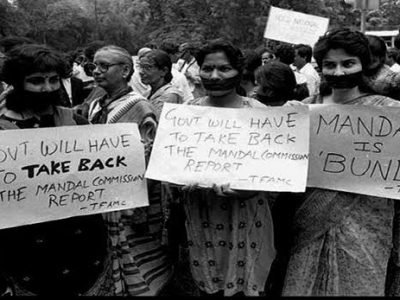
Author: Adhikarla Shraddha, 3rd year student at Amity University Mumbai.
Introduction
The Constitution of India grats certain rights and freedoms to the citizens and one such right being the right of the religious freedom in the home land of many of the religions.[1] India is a secular country which means the state has no religion and every individual enjoys the same constitutional protection without any favoritism or discrimition.[2]
Article 25 of the Indian Constitution states that:
“Freedom of conscience and free profession, practice and propagation of religion. – (1) Subject to public order, morality and health and to the other provisions of this Part, all persons are equally entitled to freedom of conscience and the right freely to profess, practise and propagate religion.
(2) Nothing in this article shall affect the operation of any existing law or prevent the State from making any law-
(a) regulating or restricting any economic, financial, political or other secular activity which may be associated with religious practice;
(b) providing for social welfare and reform or the throwing open of Hindu religious institutions of a public character to all classes and sections of Hindus.
Explanation I: The wearing and carrying of kirpans shall be deemed to be included in the profession of the Sikh religion.
Explanation II: In sub-clause (b) of clause (2), the reference to Hindus shall be construed as including a reference to persons professing the Sikh, Jaina or Buddhist religion, and the reference to Hindu religious institutions shall be construed accordingly.”[3]
From the above provision it is very clear that the constitution guarantees every individual a right to profess the religion individually or through institutions irrespective of them being a religious minority or not and also that it does not prevent the states from making laws. The states are enumerated with the power to deal with the matters of economic, political, financial or any other secular activity in consideration to the religious practices. Religious conversion becomes a part of the right to professing, practicing and propagating the religion unless it has been done in a fraudulent and coerced manner. A bill was passed in this regard by the Madhya Pradesh Assembly in 2020. The Act specifies the process and the procedure for undergoing religious conversion and it prohibits any form of unlawful religious conversion[4]. It was right on the part of the state to protect the rights of a lot of young boys and girls who were forced to convert into other religions[5]. However, it could be seen from the provisions of the Act that it violates the right to privacy, since as per Section 10 of Act one needs to declare his intention of converting into another religion 60 days before such conversion and Section 4 of the above Act could be used for taking advantage of the conversion as the person who has converted by force or fraudulent manner to certain extent he become the victim of such conversion[6].
Objectives
The very objective of this Act is to provide the freedom of religion who wish to willfully convert from one religion to another and punish those or prohibit those conversion that has been done by misrepresentation, allurement, use of threat or force, undue influence, coercion, marriage or by any fraudulent manner[7].
Need for the Law
India being a religiously diverse country is a home land of four major religions-Hinduism, Sikhism, Buddhism and Jainism. It has provided the citizens with the right to religious freedom. However there are certain restrictions that were necessary to be imposed on the right in order to protect the citizens from the forceful religious conversion. The only basis for religious conversion should be the excellence of the religion and the beliefs and the practices of such religion to be converted. There was a need for a reasonable restriction to the right so that there is forceful character for religious conversions[8]. Every state has been authorized to enact laws in this regard and even though laws of every state may differ in its content and the framework. The main aim of this being to draft the bill that constrains the individuals or the communities to convert from the religion of the forefathers and so protecting the weaker or most easily influenced sectors of the society which is usually women, children, backward, castes and untouchables[9].
Option
It is seen from the objectives of the ordinance that this law is in place to protect the individuals especially young girls,boys and women who are being allured or forced to convert their religion and to punish them with a jail term of upto 10 years. However, in order to protect women, young girls and boys from the forceful conversion a lot of people are wrongly accused of such forceful conversion. As per section 4 of the Act it stipulates that for the police to inquire or investigate the forceful conversion a written complaint of a person converted is to be made by the parents or siblings or by the grant from the court by any person who is related by blood, marriage or adoption, guardianship or the custodian ship as may be applicable.
There have been cases of false accusation by the family and the other related members as a result of them not being content with the person’s decision to convert.
It is being said by the Additional Director General of Police( Crime Against Women), Pragya Richa Srivastava that within the three months of this Bill being passed by the Madhya Pradesh state. It was stated by the police that they have registered 21 cases against 47 people with 25 arrests recorded. The records showed that 11 out of the 21 cases where registered by women who knew the accused due to them being friends, in a relationship or being married for over five years[10].
On 26th February, the two youths were booked by the police in khargone district’s Mandleshwar. The two boys were celebrating a birthday with two girls who were their classmates from the High School, at the Jam gate, also known to be a picnic spot. The four of them spotted by the local member in a hindutva outfit and were taken to the police station. The complaint was registered against Sohail Khan and Hassan Khan on 26th february by the relatives of the girls who had accused the two boys Sohail Khan and Hassan Khan for forcing them to convert.
Another case was booked under the law, it was of the Principal of the convent school in the Khajuraho on the complaint registered by the assistant librarian whose salary was cut off and the services were terminated. The Principal was later granted anticipatory bail by the High Court by arguing that the case filed was false and was registered out of frustration as the employee Ruby Singh’s services were terminated on the account of the poor attendance and lack of the proper documentation.
It was said by Maria Stephen, Public Relations Officer in the MP for the Christian Community, a global organisation that the new law is making people feel scared to even pray in their homes. It was further said that all are equal before the law however, this law is being used in a manner that it has empowered the fundamentalists to is target the minorities[11].
In one of the cases a husband and wife namely Pr. Sangeeta and Chandra Shekhar Upadhyay were arrested and imprisoned in Indore by the police after being wrongly accused of forcing the complainant to convert into christianity. It was said that Pr. Sangeeta came from a high-class religious family and from the time she became a christian, she was faced by tremendous opposition. Even then she never backed down from following the path of Christiany.
This case makes it very evident that this law empowers the extremists with the power which they are abusing or might abuse to victimize the innocent individuals[12].
It seems that this has happened due to the law being passed in a hurry, without taking this into consideration.
Analysis
Madhya Pradesh is to be one of the states that has established a proper legal framework for the religious conversions with the updated punishments that is appropriate as per the contemporary times. Before this law the state was being governed by theMadhya Pradesh Dharma Swatantrya Adhiniyam, 1968 however there were certain subjects that were included under that Act such as inheritance, right to maintenance, procedure for conversion, burden of proof lying on the accused and the marriages that are taking place with an intent to convert the person are to be null and void[13]. The Bill was passed by a voice note after discussion in the Assembly. It was said by the Home Minister Mishra that 23 cases were registered under the ordinance within a month of the Act coming into action and had stated that
“We are vehemently against all such love which hurts our sentiments and leaves our sisters and daughters in agony”[14].
This Law is being questioned by the Congress MLA Dr. Govind Singh and the state Assembly’s former deputy speaker and Congress MLA Lanji (Bhalaghat) Heena Kanware as to whether it is needed at this moment when there already exists a law including the Indian Penal Code and the Criminal Procedure Code which provides provisions for forced and fraudulent religious conversions.
The objective of the Act is very much agreeable however it is seen that this section could be misused by some to oppress and harass innocent individuals. This Act protects women’s rights in respect of maintenance whose marriage has been declared null and void and the right of the children that is born out of a marriage contravening section 3 of the Act, which has made the conversion of religion for marriage, it is seen that this Act violates the very religious freedom and the right of individuals to convert into other religion in which one wishes to as one’s parent or the relatives could be seen to file a complaint against such conversion.
References
[1] Anil Rao, Freedom Of Religion And The Supreme Court Of India, Academia, https://www.academia.edu/37634361/FREEDOM_OF_RELIGION_AND_THE_SUPREME_COURT_OF_INDIA.
[2] Dr. Radhakrishnan,Secularism in India, 127 (Edn VK Sinha), 1968.
[3] Constitution of India, 1950.
[4] The Madhya Pradesh Freedom of Religion Ordinance, 2020, PRS, https://prsindia.org/bills/states/the-madhya-pradesh-freedom-of-religion-ordinance-2020.
[5] Stuti Hasmukh Oswal, The Madhya Pradesh Freedom of Religion Act, 2020, LAW INSIDER, https://www.lawinsider.in/the-madhya-pradesh-freedom-of-religion-act-2020/.
[6] Ibid.
[7] Devika Sharma, Simplified|Madhya Pradesh Freedom of Religion Ordinance, 2020, https://www.scconline.com/blog/post/2021/01/11/simplified-madhya-pradesh-freedom-of-religion-ordinance-2020/.
[8] Why India Needs an Anti-Conversion Law, THE TRUE PICTURE, https://www.thetruepicture.org/india-needs-anti-conversion-law/.
[9] Jennifer R. Coleman, Regulating Religious Tolerance: The Legal and Political Implications of Anti-Conversion Legislation for Indian Secularism 26 (Paper Presented to Penn Program on Democracy, Citizenship, and Constitutionalism Graduate Workshop, Sept. 13, 2007–08),
[10] Imran Siddique, 3 months of MP ‘love jihad’ law: 21 cases, couple knew each other in over half, THE INDIAN EXPRESS, https://indianexpress.com/article/india/mp-love-jihad-law-7236429/.
[11] Ibid.
[12] Shibu Thomas, Female Pastor and Husband Unjustly Imprisoned in Madhya Pradesh, COUNTER CURRENTS. ORG, https://countercurrents.org/2020/09/female-pastor-and-husband-unjustly-imprisoned-in-madhya-pradesh/.
[14] Anraag Singh, Madhya Pradesh Freedom of Religion Bill, 2021 Passed in Assembly, THE NEW INDIAN EXPRESS, https://www.newindianexpress.com/nation/2021/mar/08/madhya-pradesh-freedom-of-religion-bill-2021-passed-in-assembly-2273864.html.






